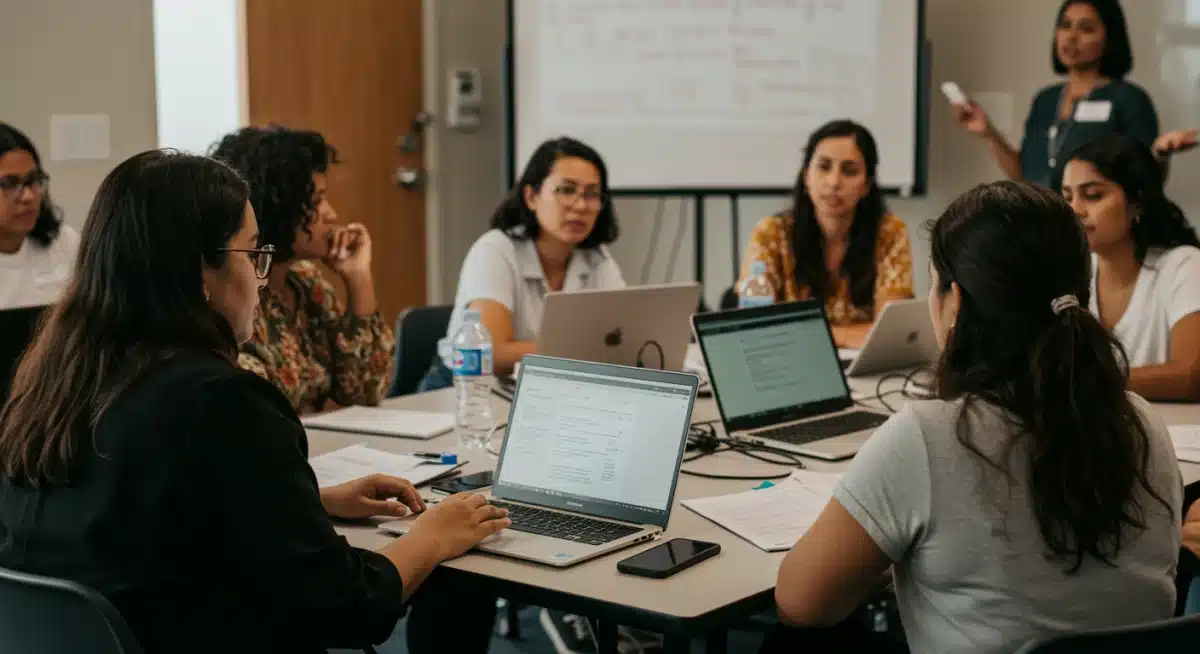Federal Grants for Single Parents: Applications Open This Quarter

Applications for federal grants specifically designed to assist single parents are now open this quarter, providing vital financial resources for housing, education, and childcare needs.
Breaking news for families across the nation: Federal Grants for Single Parents: Applications Open This Quarter. This development offers a critical lifeline for many, providing much-needed financial assistance during challenging economic times. Are you ready to explore these vital opportunities?
Understanding Federal Grants for Single Parents
Federal grants represent non-repayable funds distributed by the U.S. government to eligible individuals and organizations. For single parents, these grants are specifically tailored to alleviate financial burdens associated with raising children, covering essential expenses from housing to educational pursuits.
These programs aim to foster economic stability and improve the overall well-being of single-parent households. The current quarter marks a pivotal period for those seeking support, as various federal agencies have opened their application windows.
What Constitutes a Federal Grant?
A federal grant is essentially a financial award given by the federal government. Unlike loans, grants do not need to be repaid, making them an incredibly valuable resource. They are typically awarded based on specific criteria and for particular purposes.
- Non-repayable funds: A key distinction from loans, offering direct financial relief.
- Targeted support: Designed to address specific needs, such as housing, education, or childcare.
- Eligibility requirements: Applicants must meet certain income, family, and other criteria.
- Diverse programs: Available from various federal departments, each with unique objectives.
Why These Grants Matter Now
The economic landscape continues to present challenges for many households, with single-parent families often facing disproportionate struggles. The opening of these application periods is a timely intervention, offering a chance for stability and growth. These grants can significantly impact a family’s ability to cover basic necessities and invest in their future.
Eligibility Criteria: Who Can Apply?
Navigating the eligibility requirements for federal grants can seem complex, but understanding the core criteria is the first step toward successful application. Generally, these grants target low-income single parents, but specific programs may have additional stipulations related to residency, employment status, or educational goals.
Applicants should carefully review the guidelines for each grant program to ensure they meet all necessary qualifications. This proactive approach can save time and increase the likelihood of receiving aid.
Common Eligibility Factors
While each grant has its unique set of rules, several common factors determine eligibility across most federal programs for single parents. These often include income thresholds, household size, and specific needs.
- Income Level: Most grants are need-based, requiring applicants to fall within specific income brackets.
- Parental Status: Verification as a single parent, often including legal custody or primary caregiving responsibilities.
- Residency: U.S. citizenship or eligible non-citizen status, along with state-specific residency requirements.
- Child Dependents: Proof of dependent children living in the household.
Specific Program Variations
It’s crucial to remember that eligibility can vary significantly between different federal grant programs. For example, a grant focused on higher education may require enrollment in an accredited institution, while a housing grant might prioritize those facing homelessness or unstable living conditions. Always consult the official program documentation for precise details.
Key Grant Programs Available This Quarter
This quarter brings several federal grant opportunities for single parents into focus. These programs span various critical areas, from housing assistance to educational support and childcare subsidies. Understanding which programs are available and their specific aims is essential for a targeted application strategy.
Families should research each program thoroughly to determine which aligns best with their immediate and long-term needs. The breadth of options reflects a comprehensive effort to support single-parent households.
Housing Assistance Programs
Stable housing is a foundational need, and several federal grants aim to ensure single parents and their children have safe and affordable places to live. These programs can offer rental assistance, help with utility bills, or even support for homeownership.
- HUD Programs: The Department of Housing and Urban Development (HUD) provides various housing vouchers and public housing initiatives.
- Emergency Rental Assistance: Funds designed to prevent homelessness and housing instability.
- Homeless Assistance Grants: Support for those experiencing or at risk of homelessness.
Educational Support for Parents and Children
Investing in education is investing in the future. Federal grants are available to help single parents pursue higher education themselves or to support their children’s educational needs, including tuition, books, and other related expenses.
The aim is to reduce financial barriers to academic achievement, empowering parents to improve their career prospects and provide better opportunities for their children.
Childcare and Healthcare Subsidies
The cost of childcare and healthcare can be substantial for single-parent families. Federal programs offer subsidies and assistance to make these essential services more accessible and affordable.
These grants help cover daycare costs, childcare grants, and healthcare premiums, ensuring children receive proper care and parents can maintain employment or pursue education without undue financial stress.
The Application Process: Step-by-Step Guide
Applying for federal grants requires careful attention to detail and adherence to specific procedures. A well-prepared application significantly increases the chances of approval. This section outlines the general steps involved, from gathering necessary documents to submitting the final application.
While each grant program may have unique requirements, a systematic approach will help streamline the overall process and ensure all critical information is accurately provided.

Gathering Required Documentation
Before beginning the application, compile all necessary documents. This typically includes proof of income, identification, residency, and dependency status. Having these ready will expedite the process.
- Proof of Income: Pay stubs, tax returns, or benefit statements.
- Identification: Driver’s license, state ID, or passport.
- Proof of Residency: Utility bills or lease agreements.
- Documentation of Dependents: Birth certificates or custody agreements.
Completing the Application Forms
Federal grant applications can be extensive. Read all instructions carefully and fill out every section completely and accurately. Incomplete or incorrect applications are often rejected. Many applications are now available online, offering convenience and efficiency.
Submission and Follow-Up
Once the application is complete, submit it through the designated channels, whether online or via mail. It’s advisable to keep copies of all submitted documents for your records. After submission, some programs may require follow-up interviews or additional information, so be prepared to respond promptly.
Tips for a Successful Grant Application
Securing a federal grant can be a competitive process. To maximize your chances of success, it’s beneficial to approach the application strategically. Beyond simply meeting eligibility, presenting a clear, compelling case for why you need and deserve the assistance can make a significant difference. Attention to detail and thoroughness are paramount.
Many applicants overlook minor details that could impact their application, so taking the time to double-check everything is always a good idea. Remember, the goal is to stand out positively among other applicants.
Crafting a Compelling Personal Statement
Some grant applications require a personal statement or essay. This is your opportunity to explain your unique circumstances, how the grant will specifically benefit your family, and your plans for using the funds. Be honest, articulate, and highlight your commitment to improving your situation.
A well-written personal statement can humanize your application and convey the genuine impact the grant would have. Focus on specific challenges and how the grant would help overcome them.
Seeking Assistance and Resources
Don’t hesitate to seek help if you find the application process overwhelming. Many non-profit organizations, community centers, and government agencies offer free assistance with grant applications. These resources can provide guidance, review your documents, and offer valuable advice.
- Community Centers: Often provide workshops and one-on-one assistance.
- Non-profit Organizations: Many specialize in helping single parents access resources.
- Online Portals: Federal websites often have FAQs and contact information for support.
- Local Libraries: May offer access to computers and assistance with online forms.
Common Pitfalls to Avoid
While the prospect of receiving federal grant money is exciting, many applicants fall prey to common mistakes that can lead to their applications being rejected. Being aware of these pitfalls can help you avoid them and improve your chances of securing funding. Diligence and accuracy are your best allies in this process.
One of the most frequent issues is simply not reading the instructions thoroughly enough, leading to incomplete or incorrectly submitted forms. Always take the time to understand exactly what is being asked of you.
Incomplete or Inaccurate Information
Submitting an application with missing information or errors is a sure way to get it rejected. Double-check all facts, figures, and personal details. Ensure that all required fields are filled out and that supporting documents are current and correct.
Missing Deadlines
Grant programs operate on strict deadlines. Missing a submission deadline, even by a few hours, typically means your application will not be considered. Mark all important dates on your calendar and aim to submit well in advance to avoid last-minute issues.
Applying for Ineligible Programs
Before investing time in an application, confirm that you meet the basic eligibility criteria for that specific grant. Applying for programs for which you are clearly ineligible wastes your time and the reviewers’ time. Always conduct preliminary research to ensure a good fit.
| Key Point | Brief Description |
|---|---|
| Application Window Open | Federal grants for single parents are now accepting applications this quarter. |
| Eligibility Focus | Primarily targets low-income single parents, with specific criteria varying by program. |
| Key Aid Areas | Support covers housing, education, childcare, and essential family needs. |
| Application Tips | Gather documents, complete forms accurately, and meet deadlines for success. |
Frequently Asked Questions About Federal Grants
These grants typically cover a wide range of essential expenses including housing assistance (rent, utilities), educational costs (tuition, books), childcare services, and sometimes even medical expenses or food assistance. The specific coverage depends on the individual grant program and its designated purpose.
You can find relevant grant programs by visiting official government websites like Benefits.gov and Grants.gov. Local community centers, non-profit organizations focused on family support, and college financial aid offices are also excellent resources for discovering specific opportunities and eligibility requirements.
No, federal grants are not loans. They are forms of financial aid that do not need to be repaid, provided the recipient meets all program requirements and uses the funds for the intended purpose. This makes them a highly beneficial form of support for single-parent families.
Commonly required documents include proof of income (tax returns, pay stubs), identification (driver’s license, state ID), proof of U.S. residency or eligible immigration status, and documentation of all dependents, such as birth certificates or custody agreements. Specific grants may require additional unique documents.
Missing an application deadline usually means your application will not be considered for that funding cycle. It is crucial to be aware of and adhere to all submission dates. If you miss one, look for other available grants or wait for the next application period, as many programs operate annually.
What Happens Next
As applications for Federal Grants for Single Parents: Applications Open This Quarter continue, the coming weeks will be crucial for many families. We anticipate a high volume of submissions given the ongoing economic pressures. It is imperative for eligible single parents to act swiftly and meticulously. Further announcements regarding application processing times and additional support resources are expected from federal agencies. We will continue to monitor these developments closely, providing updates on new programs or extended deadlines as they emerge, ensuring families have the most current information to secure vital assistance.





